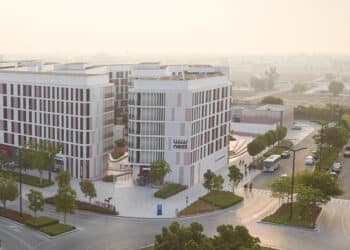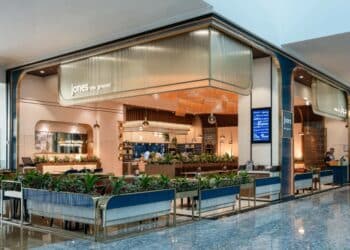Hotel News Middle East speaks to Assia Ricco, Evolvin Women, and Samir Arora, general manager of the MGallery by Sofitel, about why we should be taking notice of a campaign to empower women from developing countries by integrating them into the hospitality industry in Dubai…

You do not need to be an expert in gender politics to know that women have traditionally had a tougher time of it than men.
A simple glance at the newspaper headlines or news channels on television will confirm that women’s rights is still very much a burning issue.
With the likes of the #MeToo campaign achieving traction all over the world there has never been a better time to put women’s rights under the spotlight – the hospitality industry is no different than any other in that regard.
Hotel News Middle East spoke to Assia Riccio, from Evolvin’ Women, who is spearheading a campaign to connect women from developing countries with hotels in the Middle East.
“We work with hotels and schools in Africa, we train women there and bring them to Dubai,” says Riccio.
“We work with partners here in Dubai where the women will come and work for 12 months before going back to their own country.”
The women who take part in the programme do not have to pay anything including travel or training costs as well as a visa and accommodation.
“One of the difficulties women from other countries face when coming to Dubai is the lack of networking opportunities and making points of contact,” she says.
“All they can do is send their CVs through a website and hope for the best. If I was to show you my inbox on LinkedIn you would see what I mean!”
Riccio is adamant that the proper platform for women coming for work in Dubai from other countries does not exist yet – hence the need to provide the service.
“I know from my own experience it was my connections that made it possible for me to come to Dubai,” she says.
“I certainly was not called here.”
Riccio comes from a family of philanthropists in the south of Italy, and it was her formative years that helped to place the passion to help others inside her.
“At Christmas we might get 10 gifts but choose to keep only one,” she says.

“I remember my parents would go to other countries and come back with children who needed support. At the end of the school year they would go back to their own countries and my mum would say ‘they have to go back to help their own families and communities with what they have learned’.”
One hotelier who is very much on board with the Evolvin Women ethos is Samir Arora, general manager of the MGallery by Sofitel.
“One of the biggest challenges that women face in the workplace is the hours you are expected to work,” says Arora.
“It is a very demanding business and women tend to work up until the age of 33 or 35 and then they either move to a different industry to have more suitable working hours or carry on with their family life.”
Arora is uniquely placed to speak about the property as the MGallery by Sofitel is a hotel that is geared specifically towards female clientele.
“We are a women-centric concept and, while it is not about favouring them, it is important to give women equal opportunities to men,” she says.
“That said, we have identified certain departments and roles in which we will only recruit women, as a result 33% of our workforces is female, which is quite a significant number – especially for Dubai. We are keen to increase that percentage as well.”
More women will be looking for employment in the hospitality sector, says Riccio, because of a paradigm shift in terms of females being more focused on their careers than having families.
“The new generation of women talk less and less about having a family here,” she says.
“They are really ambitious and career driven and this will change the whole landscape of the industry as the focus will be ‘I want to create a life for myself first and then maybe look at putting a family in place’.
“Women in the region have lots of opportunities compared to 10 years ago so it is now time to put the focus on how you can use all of this to inspire women from outside who have less opportunities.”
The focus of Evolvin Women is not so much about shaking up the hotel industry as giving women opportunities to improve their lives.
“I think there is already so much going on in hotels for women with development programmes and initiatives – to be honest, you can probably go into any hotel in Dubai and find a leadership programme in place,” she says.
“Coming in and offering a two-day programme is not going to change the situation in hotels. That is why we moved away from empowering within a hotel to use the business to empower women in the community outside a hotel.”
Riccio is keen to counter the suggestion that empowering women means they have to receive preferential treatment.
“I was talking to a client a couple of weeks ago about women in the workplace and she asked me why do you always talk about gender equality instead of women’s empowerment?” she says.
“You can go into a kitchen and find 90% men and only 10% women but if you look at the PR and marketing industry you will find that you traditionally have more females than males being employed.
“It is not only about women when it comes to creating equality in an organisation, it just so happens that most of the time it is about women because they are in junior roles, but it is about creating a 50/50 balance,” she adds.
One of the most hotly discussed issues when it comes to women in the workplace has been the ‘glass ceiling’, a reference to the fact that women can only reach so far in a company compared to their male counterparts.
The problems are much more nuanced that that, suggests Riccio.
“It is actually more of the case that the ‘sticky floor’ is a problem, by that I mean women find it more difficult to get off the floor and onto the first step of the career ladder,” she says.
“Men, on the other hand, are really good at getting into the workforce, women are naturally brilliant at networking. So once we are on the career ladder we find it very easy to get up there and smash the glass ceiling in my personal opinion.”
The key, says Riccio, is to ensure that gender bias is neutralised.
“You need to give the same amount of paternity leave to a father as you give a mother for maternity leave,” she says.
“You have to give the same opportunities to men and women, that is the message you need to send as an organisation.”
Those opportunities are starting to emerge, says Riccio.
“There are certain organisations that give the schooling allowance to the mother, not the father, to neutralise the suggestion that the father is the sole bread-winner,” she says.
“There are plenty of successful women in Dubai who were at a tipping point in their careers when deciding to have a family or not.
“Their husbands were able to stay at home for three years.”
It is clear from speaking to Riccio and Arora that we will be seeing plenty more successful women in the years to come.


































































